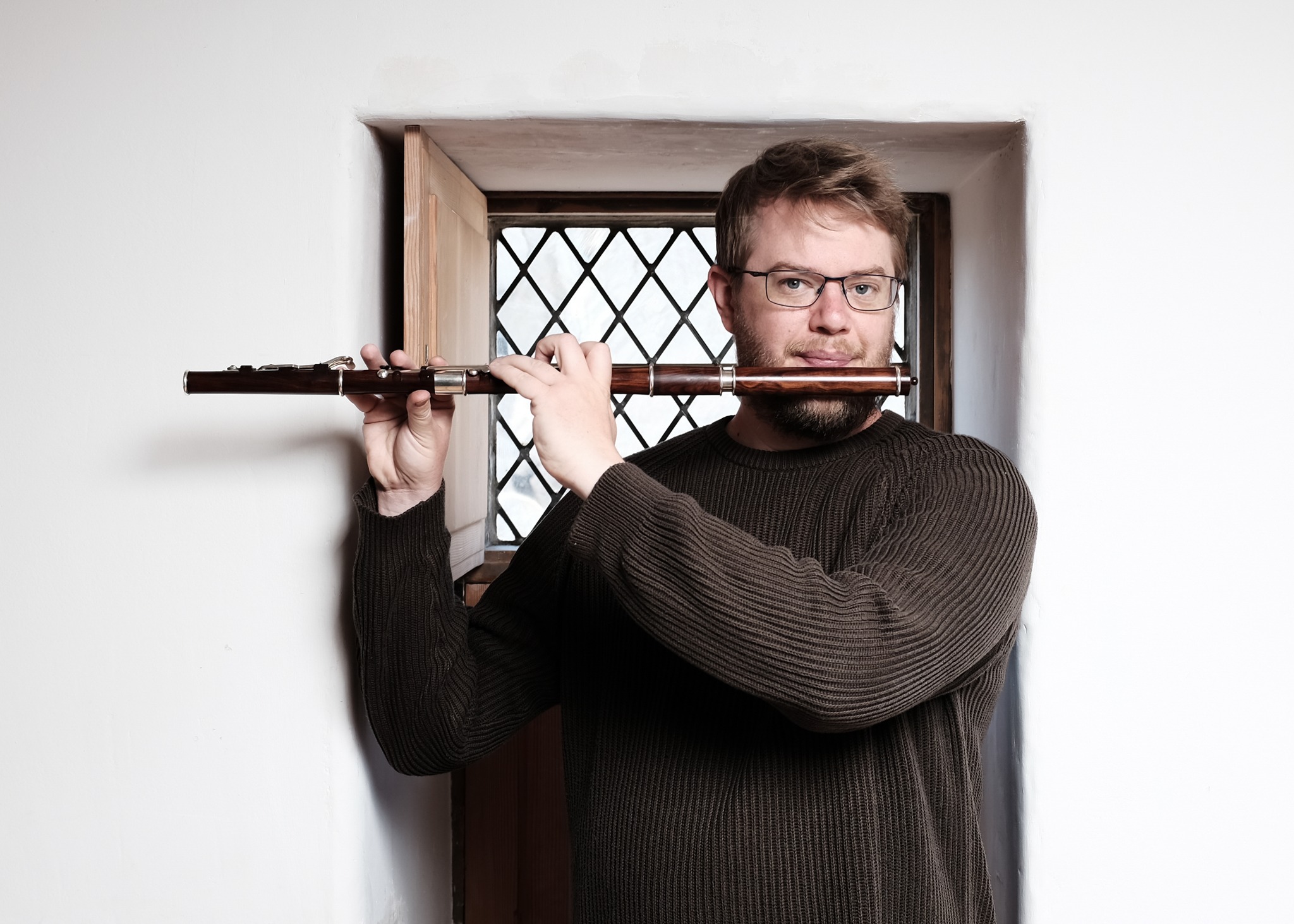📷 Photos by Archie Macfarlane
11/03/20 – Ross Couper and I boarded a flight to Switzerland for a tour with our sound engineer Pete Ord and a huge amount of high end PA and recording equipment. The plan was to record the tour and make a live album. We knew about Covid 19 and that travelling was a risk but were re-assured that it was nothing major and the tour would be going ahead. The next day things were escalating and the threat of lockdown in Switzerland was becoming more likely. We set up and had the first gig in Schaffhausen to a small but brave and incredibly supportive audience. Halfway though the show we played a set that involved me swapping from flute to guitar. My ireplaceable 8 key cocuswood flute made for me by the late Michael Grinter was laying in my lap and as I leaned to switch my guitar on I heard (and felt) an almighty crack. Clocks stopped turning for a second as I dreaded to look down and see what had happened. Worst fears time as the flute had literally shattered to pieces around the bottom tenon. I quickly signalled to Ross that the whole set basically would have to change and luckily adaptability (winging it) is kind of our thing. I picked up the guitar. The flute went in the box. We finished the show and I didn’t open the box again for weeks.
Day after and more Covid news coming in all the time. We were becoming more aware all the time that this tour could face cancellation at any time but managed one more show that night (without a flute) before everything stopped. We stayed in Switzerland for another day managing an online show (which at the time was a fairly novel concept) before travelling back through a very busy and very maskless Heathrow, home to Scotland. Suspected Covid and weeks of illness followed.
At the time I had no real replacement for that flute. The lack of work made the need not particularly urgent and the repairs were beyond anyone but the very best makers in the world to fix. Teaching and online appearances began to present themselves over the months and I made do with unkeyed flutes, whistles and Bansuri. Not the same but something at least. I couldn’t record though or teach or perform properly on any of them. Luckily through the charity ‘Help Musicians’ a little hardship funding was available and I began the hunt for an instrument that would allow me to work again.
To cut a very long story slightly shorter. Many, many flutes began to pass through my hands. I learned more and more about the antique instruments, their history and how they are restored. I began to buy in auctions and get the flutes to restorers to fix up and started buying tools to do the basic repairs myself. I sold some on to fund new purchases and the whole process was a welcome distraction from the reality of the pandemic and the decimated music scene.

We were living at the time in a small flat in an amazing old historic building called Lambs House that had been lovingly restored to it’s glory years and was full of the most stunning acoustic spaces made of wood and stone. With the owners away and lockdown a reality I began using the different spaces (with permission of course!) to record at night when my family were asleep and all silent outside. Some seriously spooky dimly lit recordings in huge echoey spaces ensued as well as dram fuelled late night jigs and reels.
After a few months there was a hell of a lot of very disorganised music scattered across a collection of hard drives, cloud drives and various devices and to be honest it sat there for a while whilst the day to day life of parenting, organising and taking part in gloriously underpaid ‘online events’ and generally getting through life happened. I was walking miles and miles every day. Partly to get my daughter to sleep, partly to go someway towards easing the cabin fever and I started listening to these tracks to see if perhaps there might be something I could do with them. Over 40 tracks of solo, unmixed flute were there to listen to and eventually I got rid of most of them but was left with around 15 that I was pretty happy with. These included two long improvisations (10 minutes plus) that I’d made in the absolute dead of night when the house and adjoining buildings were silent. Track 9 ‘Debussy and the Low B’ was actually recorded first in an adjoining building called ‘The Pavilion’ which I had been generously allowed to use for some filming of teaching videos. The silence mid-lockdown was unbelievable. The Shore in Leith is a busy area usually. Loads of traffic, drunk people, street cleaners etc but sometime I think in June 2020 (who knows really) everything just stopped. I think on this night it was around 3am after a couple of whiskeys and I was playing this mad old flute given to me by the living legend Cathal Mc Connell. He had handed it to me in a spar carrier bag as thanks for helping to get his performing flutes repaired a number of years earlier. The flute had been stuck together with that flesh coloured Elastoplast tape that somehow is the stickiest substance on earth. I had never seen anything like it. Ivory head (cracked) and an incredible amount of keys that took months just to figure out what they did. It looked like it had at some point become sentient and had a wild time touring rock festivals for a decade or something. Anyway, I’d had it restored a good while before and it was really, really quiet and not too useful for playing outside the house. Something about the bright acoustics of the Pavillion, and the silence outside got me absorbed in this instrument for hours and towards the end of the night I hit record. One very long take ensued. It was trimmed down a lot and made the cut. It became more of a composition as I remembered bits of it to sculpt an accompaniment out of other flute parts and sound effects. On the track you can hear a sample of live air traffic control from the US. It felt like this summed up the feeling at the time that I almost got to the place where I didn’t know if I’d ever be able to travel again.
The other long piece came as a result of improvisation too but this one was a lot more deliberate. Recorded in the vaulted and all wooded ‘studio’ in the house after finally finding ‘the flute’ amongst all my collecting and searching.
A Rudall Rose is in some ways a rights of passage for any traditional flute player or collector of old instruments. It’s that mythical being that you’ve heard of even when you’ve never tried one before. All the great early flute albums featured one. All the big names had them in their collection and I was lucky enough to try loads of them at once (after never even seeing one in reality before) when I visited the incredible Chris Wilkes to finally take my beloved Grinter for repair. I tried a lot of Rudalls and was immediately hooked.
Skipping forward a few months again and a friend said that he knew of one (Rudall Rose #5211) that was no longer being played in Edinburgh. I was beyond excited cycling across town to meet the owner and loved it. They were one of those rare and lovely people that cared more about the instrument and it’s legacy than making tons of money and I swiftly (and luckily) managed to sell another flute in order to make the purchase. About three weeks later the first track on the album ‘Water Street #5211’ was recorded. An instrument has never felt better in a space to me and the resulting composition hopefully demonstrated what was possible with that instrument in that acoustic at that time. I doubt I’ll ever be able to replicate it. Again it was edited down but the reverb you hear on the main instrument is just the sound of the room. No effects at all. Accompaniment was put together slowly with lots of flute parts and effects from my voyages as a Sound Designer.
All the tracks have a similar story but I won’t bore you too much with those. The sleeve notes say it all.
Mixing was the tough part and the steepest learning curve for me in years. A lot of self doubt over wether I could do it at all and a gradual realisation that with a little help it was possible. I applied for a little funding from Edinburgh Council to take a few lessons with a friend who eventually mastered the album too. His patience was unreal and eventually, bit by bit we got there.
I guess for the sake of this blog at least I should try and find a message or a meaning to all this but honestly the whole process was a way to make the brutality of isolation just that little more bearable. It wasn’t really on purpose but the making time for just doing a small amount of something creative eventually led to having a pile of music that could be shaped into something. The amount of times it nearly didn’t happen was staggering. I still don’t really know if it’s actually any good or not but people seem to like it and it’s definitely put me in a better place than I would have been without it. I write this on the same day as I’m about to announce that the ‘big gig’ for the album at Celtic Connections is cancelled. I’m somewhat numb about that to be honest. On one hand it’s pretty devastating but others at the moment have lost so much more. We roll with the punches. Keep making nice things. Keep on keeping on.
Thanks for reading my waffle, Tom
**********
The album Water Street is available on Bandcamp from windowweatherrecords.bandcamp.com






